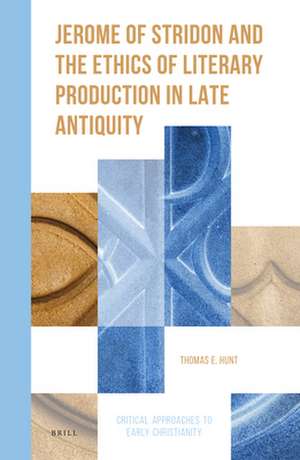Jerome of Stridon and the Ethics of Literary Production in Late Antiquity: Critical Approaches to Early Christianity, cartea 2
Autor Thomas E. Hunten Limba Engleză Hardback – 8 ian 2020
Preț: 1022.13 lei
Preț vechi: 1246.51 lei
-18% Nou
Puncte Express: 1533
Preț estimativ în valută:
195.61€ • 203.46$ • 161.49£
195.61€ • 203.46$ • 161.49£
Carte disponibilă
Livrare economică 25 martie-08 aprilie
Preluare comenzi: 021 569.72.76
Specificații
ISBN-13: 9789004417465
ISBN-10: 900441746X
Dimensiuni: 155 x 235 mm
Greutate: 0.61 kg
Editura: Brill
Colecția Brill
Seria Critical Approaches to Early Christianity
ISBN-10: 900441746X
Dimensiuni: 155 x 235 mm
Greutate: 0.61 kg
Editura: Brill
Colecția Brill
Seria Critical Approaches to Early Christianity
Notă biografică
Thomas E. Hunt is Senior Lecturer in Theology at Newman University, Birmingham.
Cuprins
Acknowledgments
Introduction
1 Knowing Jerome: Reading and Communities
2 The Ethics of Literary Production in Late Antiquity
3 Jerome’s Biography
4 Reconstructing Jerome’s Ethics of Literary Production
1 Writing across the Sea: Jerome’s Commentaries on Philemon and Titus
1 Introduction
2 Jerome’s Pauline Commentaries
3 Ethics and the Pauline Renaissance of Fourth-Century Rome
4 Literary Production and the Commentary Form
5 Scriptural Reading and the Ethics of Literary Production in the Prefaces to the Commentaries on Titus and Philemon
6 Conclusion
2 Recapitulation and Literary Ethics in the Commentary on Ephesians
1 Introduction
2 Eph. 1.10b in Jerome’s Commentary: Coherence and Incoherence
2.1The Coherence of Jerome’s Comment on Ephesians 1:10b
2.2The Incoherence of Jerome’s Comment on Ephesians 1:10b
3 Recapitulation and Typology in Jerome’s Comment on Eph. 1:10b
3.1The Theology of Reading: Recapitulation and Typology from Paul to Tyconius
3.2Ephesians 1:10b and the Eschatological Ethics of Reading
4 Conclusion
3 Imitation in the Commentary on Ephesians
1 Imitating the Apostle in the Ephesians Commentary
2 Proverbs 8:22 and the Christian Life in the Commentary
3 The Commentary on Ephesians as a Product of Mimēsis
4 ‘Learning Christ’ and Conscientia
5 Conclusion
4 Reading and Being in the Commentary on Ephesians
1 Christology, Reading and ‘Passing Over’
2 Familiarity, Difference and Abjection
3 A Performance of Scriptural Reading: Ephesians 3:16–19
4 Conclusion
5 Hebrew in Jerome’s Literary Production
1 Introduction
2 Hebrew in the Late Ancient Mediterranean
3 The Stability of the Hebraica Veritas
4 Ethics and the Disruption of Order
5 Conclusion
6 Ethics and the Self in the Life of Hilarion
1 Introduction
2 The Context of the Life of Hilarion
2.1The Experience of the Holy Places in Letter 46
2.2The Pharisees
3 The Life of Hilarion
4 The Ethics of Seeing
5 Authorial Practice and the Imitation of Christ
6 Narrating ‘Particular Virtues’
7 Conclusion
7 Paul and the Incarnation in Jerome’s Commentary on Galatians
1 Introduction
2 Galatians 2:11–14 in Jerome’s Commentary and His Letter 49
3 Augustine and the Problem of Pedagogic Pretence
4 Language, Reading and Simulatio in Jerome
5 Conclusion
8 Against Jovinian and Ascetic Responsibility
1 Baptism and Cosmic Order in the Teaching of Jovinian
2 The Diversity of Human Society in Against Jovinian
3 The Incarnation as the Model of Human Behaviour
4 Soteriology and Responsibility
5 Conclusion
9 On Famous Men and the Ruins of Late Antiquity
1 Introduction
2 Origen’s Fifth Homily on Luke: Ruined Cities and Empty Signs
3 On Famous Men and a Universal Christianity
4 The Ruin of Stridon and the Memory of Jerome
5 Conclusion
Conclusion
Bibliography
Index
Introduction
1 Knowing Jerome: Reading and Communities
2 The Ethics of Literary Production in Late Antiquity
3 Jerome’s Biography
4 Reconstructing Jerome’s Ethics of Literary Production
1 Writing across the Sea: Jerome’s Commentaries on Philemon and Titus
1 Introduction
2 Jerome’s Pauline Commentaries
3 Ethics and the Pauline Renaissance of Fourth-Century Rome
4 Literary Production and the Commentary Form
5 Scriptural Reading and the Ethics of Literary Production in the Prefaces to the Commentaries on Titus and Philemon
6 Conclusion
2 Recapitulation and Literary Ethics in the Commentary on Ephesians
1 Introduction
2 Eph. 1.10b in Jerome’s Commentary: Coherence and Incoherence
2.1The Coherence of Jerome’s Comment on Ephesians 1:10b
2.2The Incoherence of Jerome’s Comment on Ephesians 1:10b
3 Recapitulation and Typology in Jerome’s Comment on Eph. 1:10b
3.1The Theology of Reading: Recapitulation and Typology from Paul to Tyconius
3.2Ephesians 1:10b and the Eschatological Ethics of Reading
4 Conclusion
3 Imitation in the Commentary on Ephesians
1 Imitating the Apostle in the Ephesians Commentary
2 Proverbs 8:22 and the Christian Life in the Commentary
3 The Commentary on Ephesians as a Product of Mimēsis
4 ‘Learning Christ’ and Conscientia
5 Conclusion
4 Reading and Being in the Commentary on Ephesians
1 Christology, Reading and ‘Passing Over’
2 Familiarity, Difference and Abjection
3 A Performance of Scriptural Reading: Ephesians 3:16–19
4 Conclusion
5 Hebrew in Jerome’s Literary Production
1 Introduction
2 Hebrew in the Late Ancient Mediterranean
3 The Stability of the Hebraica Veritas
4 Ethics and the Disruption of Order
5 Conclusion
6 Ethics and the Self in the Life of Hilarion
1 Introduction
2 The Context of the Life of Hilarion
2.1The Experience of the Holy Places in Letter 46
2.2The Pharisees
3 The Life of Hilarion
4 The Ethics of Seeing
5 Authorial Practice and the Imitation of Christ
6 Narrating ‘Particular Virtues’
7 Conclusion
7 Paul and the Incarnation in Jerome’s Commentary on Galatians
1 Introduction
2 Galatians 2:11–14 in Jerome’s Commentary and His Letter 49
3 Augustine and the Problem of Pedagogic Pretence
4 Language, Reading and Simulatio in Jerome
5 Conclusion
8 Against Jovinian and Ascetic Responsibility
1 Baptism and Cosmic Order in the Teaching of Jovinian
2 The Diversity of Human Society in Against Jovinian
3 The Incarnation as the Model of Human Behaviour
4 Soteriology and Responsibility
5 Conclusion
9 On Famous Men and the Ruins of Late Antiquity
1 Introduction
2 Origen’s Fifth Homily on Luke: Ruined Cities and Empty Signs
3 On Famous Men and a Universal Christianity
4 The Ruin of Stridon and the Memory of Jerome
5 Conclusion
Conclusion
Bibliography
Index


